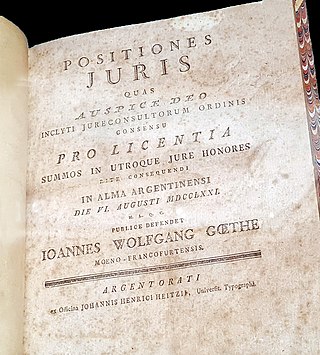Related Research Articles

Postgraduate education, graduate education, or graduate school consists of academic or professional degrees, certificates, diplomas, or other qualifications usually pursued by post-secondary students who have earned an undergraduate (bachelor's) degree.
An academic degree is a qualification awarded to a student upon successful completion of a course of study in higher education, usually at a college or university. These institutions often offer degrees at various levels, usually divided into undergraduate and postgraduate degrees. The most common undergraduate degree is the bachelor's degree, although some educational systems offer lower-level undergraduate degrees such as associate and foundation degrees. Common postgraduate degrees include engineer's degrees, master's degrees and doctorates.

A master's degree is a postgraduate academic degree awarded by universities or colleges upon completion of a course of study demonstrating mastery or a high-order overview of a specific field of study or area of professional practice. A master's degree normally requires previous study at the bachelor's level, either as a separate degree or as part of an integrated course. Within the area studied, master's graduates are expected to possess advanced knowledge of a specialized body of theoretical and applied topics; high order skills in analysis, critical evaluation, or professional application; and the ability to solve complex problems and think rigorously and independently.
A bachelor's degree or baccalaureate is an undergraduate degree awarded by colleges and universities upon completion of a course of study lasting three to six years. The two most common bachelor's degrees are the Bachelor of Arts (BA) and the Bachelor of Science. In some institutions and educational systems, certain bachelor's degrees can only be taken as graduate or postgraduate educations after a first degree has been completed, although more commonly the successful completion of a bachelor's degree is a prerequisite for further courses such as a master's or a doctorate.

Undergraduate education is education conducted after secondary education and before postgraduate education, usually in a college or university. It typically includes all postsecondary programs up to the level of a bachelor's degree. For example, in the United States, a student pursuing an associate or bachelor's degree is known as an undergraduate student while a student pursuing a master's or doctoral degree is a graduate student. Upon completion of courses and other requirements of an undergraduate program, the student would earn the corresponding degree. In some other educational systems, undergraduate education is postsecondary education up to and including the level of a master's degree; this is the case for some science courses in Britain and some medicine courses in Europe.

A Master of Science is a master's degree. In contrast to the Master of Arts degree, the Master of Science degree is typically granted for studies in sciences, engineering and medicine and is usually for programs that are more focused on scientific and mathematical subjects; however, different universities have different conventions and may also offer the degree for fields typically considered within the humanities and social sciences. While it ultimately depends upon the specific program, earning a Master of Science degree typically includes writing a thesis.

The Bologna Process is a series of ministerial meetings and agreements between European countries to ensure comparability in the standards and quality of higher-education qualifications. The process has created the European Higher Education Area under the Lisbon Recognition Convention. It is named after the University of Bologna, where the Bologna declaration was signed by education ministers from 29 European countries in 1999. The process was opened to other countries in the European Cultural Convention of the Council of Europe, and government meetings have been held in Prague (2001), Berlin (2003), Bergen (2005), London (2007), Leuven (2009), Budapest-Vienna (2010), Bucharest (2012), Yerevan (2015), Paris (2018), and Rome (2020).
A diploma mill or degree mill is a business that sells illegitimate diplomas or academic degrees, respectively. The term diploma mill is also used pejoratively to describe any educational institution with low standards for admission and graduation, low career placement rate, or low average starting salaries of its graduates.

The Master of Music is, as an academic title, the first graduate degree in music awarded by universities and conservatories. The MM combines advanced studies in an applied area of specialization with graduate-level academic study in subjects such as music history, music theory, or music pedagogy. The degree, which takes one or two years of full-time study to complete, prepares students to be professional performers, conductors, and composers, according to their area of specialization. The MM is often required as the minimum teaching credential for university, college, and conservatory instrumental or vocal teaching positions.

A postgraduate diploma is a postgraduate qualification at the level of a master's degree, awarded after a university degree, which supplements the original degree and awards them with a graduate diploma. The minimum requirement of completing a Bachelor's degree is necessary to start the Postgraduate course. The duration of a Postgraduate course can vary from 1 year to 2 years.

A licentiate is an academic degree present in many countries, representing different educational levels. It may be similar to a master's degree when issued by pontifical universities and other universities in Europe, Latin America, and Syria.

The European Higher Education Area (EHEA) was launched in March 2010, during the Budapest-Vienna Ministerial Conference, on the occasion of the 10th anniversary of the Bologna Process.
A Master of Advanced Studies, or Master of Advanced Study, is a postgraduate degree awarded in various countries. Master of Advanced Studies programs may be non-consecutive programs tailored for "specific groups of working professionals with well-defined needs for advanced degree work" or advanced research degrees. With the exception of the several schools in the UK, advanced studies programs tend to be interdisciplinary and tend to be focused toward meeting the needs of professionals rather than academics. The Master of Advanced Studies is also often referred as Executive Master because it is aimed at working professionals

The Australian Qualifications Framework (AQF) specifies the standards for educational qualifications in Australia. It is administered nationally by the Australian Government's Department of Industry, with oversight from the States and Territories, through the Standing Council of Tertiary Education Skills and Employment. While the AQF specifies the standards, education and training organisations are authorised by accrediting authorities to issue a qualification.
A Diplom is an academic degree in the German-speaking countries Germany, Austria, and Switzerland and a similarly named degree in some other European countries including Albania, Bulgaria, Belarus, Bosnia and Herzegovina, Croatia, Estonia, Finland, Poland, Russia, and Ukraine and only for engineers in France, Greece, Hungary, North Macedonia, Romania, Serbia, Slovenia, and Brazil.

Education in Belgium is regulated and for the most part financed by one of the three communities: Flemish, French and German-speaking. Each community has its own school system, with small differences among them. The federal government plays a very small role: it decides directly the age for mandatory schooling and indirectly the financing of the communities.
The ECTS grading scale is a grading system defined in the European Credit Transfer and Accumulation System (ECTS) framework by the European Commission. Since many grading systems co-exist in Europe and, considering that interpretation of grades varies considerably from one country to another, if not from one institution to another, the ECTS grading scale has been developed to provide a common measure and facilitate the transfer of students and their grades between European higher education institutions, by allowing national and local grading systems to be interchangeable. Grades are reported on a carefully calibrated and uniform A-to-F scale combined with keywords and short qualitative definitions. Each institution makes its own decision on how to apply the ECTS grading scale to its system.
Master's degrees in Europe are the second cycle of the Bologna process, following on from undergraduate bachelor's degrees and preceding third cycle doctorates. Master's degrees typically take two years to complete, although the number of years varies between countries, and correspond to 60 – 120 ECTS credits. Within the European Higher Education Area, representing almost all countries in Europe, master's degrees are referenced to the Framework of Qualifications for the European Higher Education Area and national qualifications frameworks.
Transfer credit, credit transfer, and advanced standing are the terms used by colleges and universities for the procedure of granting credit to a student for educational experiences or courses undertaken at another institution. This is a subset of recognition of prior learning.

Higher education in Norway is offered by a range of ten universities, nine specialised universities, 24 university colleges as well as a range of private university colleges. The national higher education system is in accordance with the Bologna process, with bachelor's degrees, master's degrees and doctoral degrees. Acceptance is offered after finishing upper secondary school and meeting general university admissions certification.
References
- ↑ "What Are Academic Transcripts? Everything You Need to Know for Admissions Success". Edvoy.com.
{{cite web}}:|first=missing|last=(help) - ↑ "Transcripts" . Retrieved 9 January 2013.
- ↑ "Unofficial vs. Official Transcript". Case Western Reserve University. 24 November 2021.
- ↑ Swidey, Neil (June 17, 2016). "Boston Globe: Colleges must stop holding student transcripts hostage". The Boston Globe.
- ↑ Lindorff, Dave (May 2, 2012). "LA Times: Holding Student Transcripts Hostage". The Los Angeles Times.
- ↑ Fry, Hannah (19 March 2019). "USC places hold on student accounts of those linked to college admissions scandal". LA Times.
- 1 2 Directorate-General for Education and Culture: ECTS Users' Guide. European Credit Transfer and Accumulation System and the Diploma Supplement, Brussels, 2005, p. 26;
- ↑ Directorate-General for Education and Culture: What are the key documents of ECTS? Archived 2013-09-18 at the Wayback Machine